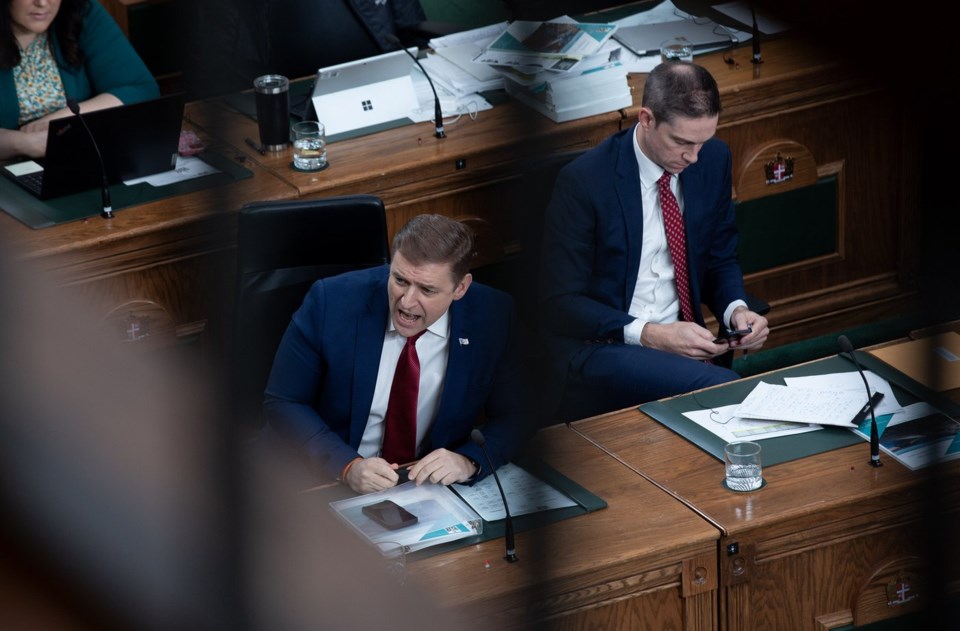ST. JOHN'S, N.L. — Newfoundland and Labrador's Opposition Progressive Conservatives vowed Wednesday that they will not vote on a draft energy deal with Quebec's hydro utility until it is scrutinized by independent experts.
Progressive Conservative Leader Tony Wakeham asked that a vote set for Thursday be suspended until there is an arm's-length review of the tentative contract. He made the request in the provincial legislature on the third day of debate on the memorandum of understanding signed last month between the two provinces.
"We won't vote on a resolution until this independent review takes place," Wakeham told reporters.
The tentative agreement would see Hydro-Québec pay far more than it currently does for power from the Churchill Falls hydroelectric plant and develop more hydroelectric projects with Newfoundland and Labrador Hydro. Wakeham said Wednesday that with the information released so far, it's impossible to know whether the contract is the best possible deal for the province.
Government officials have said independent firms were contracted to provide advice during negotiations. Representatives from two such companies — Power Advisory and JP Morgan — were called to appear before the legislature Wednesday.
"I think it is a very good deal," said Jason Chee-Aloy, managing director with Power Advisory. His Toronto-based firm was hired by Newfoundland and Labrador Hydro in 2023 to assess the market for Labrador energy.
He called the memorandum of understanding "a necessary step" before negotiation of a final agreement, expected in 2026. "So we'll know if it is absolutely the best deal — I'm sure it will be — with the (final) agreements," he said.
Premier Andrew Furey has promised to assemble an independent expert panel to provide advice as Newfoundland and Labrador Hydro negotiates the final details with Hydro-Québec. Chee-Aloy agreed about the need for independent oversight, and said he felt the panel was the right move.
The stakes for Newfoundland and Labrador are particularly high given its bruising history with hydroelectric projects. Thanks to a contract signed in 1969, Hydro-Québec has been buying the lion's share of the power from the Churchill Falls plant at bargain-basement prices, and then selling it for a steep profit. The deal unveiled on Dec. 12 would end that arrangement about 16 years early and "right a historic wrong," according to Furey.
Under the new agreement, Hydro-Québec would pay about 30 times more for Churchill Falls power, netting the provincial treasury about $17 billion until 2041 — an average of about $1 billion a year. By 2056, the annual average revenue is forecast to hit $4 billion. Under the current contract, the province receives about $20 million a year.
Unlike the 1969 deal, the new rates paid by Hydro-Québec would be tied to the energy market, meaning Quebec's payments could rise if energy prices go up. Chee-Aloy said he and his firm helped shape the framework to determine those prices.
Now is the right time for the provinces to strike a deal, he added, noting that Quebec is hungry for energy and the Newfoundland and Labrador government has been pushing to end the lopsided 1969 contract for decades — even fighting it unsuccessfully in the Supreme Court of Canada.
Wakeham said his call for an independent review is in line with recommendations of a report that followed a public inquiry into the disastrous Muskrat Falls hydroelectric project in Labrador, which was completed in 2023 after years of delay and billions of dollars in cost overruns.
Liberal house leader John Hogan denied Wakeham's request to delay the vote, saying any projects in the agreement that affect ratepayers would be subject to scrutiny by the province's utilities board — a step that didn't happen for Muskrat Falls.
The Churchill Falls facility has a generating capacity of around 5,400 megawatts and produces about 34 billion kilowatt hours annually — roughly enough to power Denmark, according to the U.S. Energy Information Administration.
This report by The Canadian Press was first published Jan. 8, 2025.
Sarah Smellie, The Canadian Press

